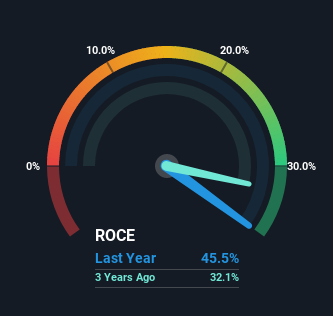- United Kingdom
- /
- Professional Services
- /
- LSE:PAGE
PageGroup (LON:PAGE) Might Become A Compounding Machine
If you're looking for a multi-bagger, there's a few things to keep an eye out for. Firstly, we'd want to identify a growing return on capital employed (ROCE) and then alongside that, an ever-increasing base of capital employed. Put simply, these types of businesses are compounding machines, meaning they are continually reinvesting their earnings at ever-higher rates of return. That's why when we briefly looked at PageGroup's (LON:PAGE) ROCE trend, we were very happy with what we saw.
Return On Capital Employed (ROCE): What Is It?
For those that aren't sure what ROCE is, it measures the amount of pre-tax profits a company can generate from the capital employed in its business. To calculate this metric for PageGroup, this is the formula:
Return on Capital Employed = Earnings Before Interest and Tax (EBIT) ÷ (Total Assets - Current Liabilities)
0.46 = UK£219m ÷ (UK£804m - UK£322m) (Based on the trailing twelve months to June 2022).
So, PageGroup has an ROCE of 46%. In absolute terms that's a great return and it's even better than the Professional Services industry average of 15%.
Check out the opportunities and risks within the GB Professional Services industry.

Above you can see how the current ROCE for PageGroup compares to its prior returns on capital, but there's only so much you can tell from the past. If you'd like, you can check out the forecasts from the analysts covering PageGroup here for free.
The Trend Of ROCE
PageGroup deserves to be commended in regards to it's returns. The company has employed 70% more capital in the last five years, and the returns on that capital have remained stable at 46%. Now considering ROCE is an attractive 46%, this combination is actually pretty appealing because it means the business can consistently put money to work and generate these high returns. If PageGroup can keep this up, we'd be very optimistic about its future.
On a side note, PageGroup's current liabilities are still rather high at 40% of total assets. This effectively means that suppliers (or short-term creditors) are funding a large portion of the business, so just be aware that this can introduce some elements of risk. Ideally we'd like to see this reduce as that would mean fewer obligations bearing risks.
What We Can Learn From PageGroup's ROCE
In short, we'd argue PageGroup has the makings of a multi-bagger since its been able to compound its capital at very profitable rates of return. However, over the last five years, the stock has only delivered a 38% return to shareholders who held over that period. So because of the trends we're seeing, we'd recommend looking further into this stock to see if it has the makings of a multi-bagger.
PageGroup does have some risks, we noticed 2 warning signs (and 1 which is significant) we think you should know about.
High returns are a key ingredient to strong performance, so check out our free list ofstocks earning high returns on equity with solid balance sheets.
New: Manage All Your Stock Portfolios in One Place
We've created the ultimate portfolio companion for stock investors, and it's free.
• Connect an unlimited number of Portfolios and see your total in one currency
• Be alerted to new Warning Signs or Risks via email or mobile
• Track the Fair Value of your stocks
Have feedback on this article? Concerned about the content? Get in touch with us directly. Alternatively, email editorial-team (at) simplywallst.com.
This article by Simply Wall St is general in nature. We provide commentary based on historical data and analyst forecasts only using an unbiased methodology and our articles are not intended to be financial advice. It does not constitute a recommendation to buy or sell any stock, and does not take account of your objectives, or your financial situation. We aim to bring you long-term focused analysis driven by fundamental data. Note that our analysis may not factor in the latest price-sensitive company announcements or qualitative material. Simply Wall St has no position in any stocks mentioned.
About LSE:PAGE
PageGroup
Provides recruitment consultancy and other ancillary services in the United Kingdom, rest of Europe, the Middle East, Africa, the Asia Pacific, and the Americas.
Excellent balance sheet with reasonable growth potential.
Similar Companies
Market Insights
Community Narratives


Recently Updated Narratives

Constellation Energy Dividends and Growth

CoreWeave's Revenue Expected to Rocket 77.88% in 5-Year Forecast

Bisalloy Steel Group will shine with a projected profit margin increase of 12.8%
Popular Narratives


MicroVision will explode future revenue by 380.37% with a vision towards success


NVDA: Expanding AI Demand Will Drive Major Data Center Investments Through 2026



